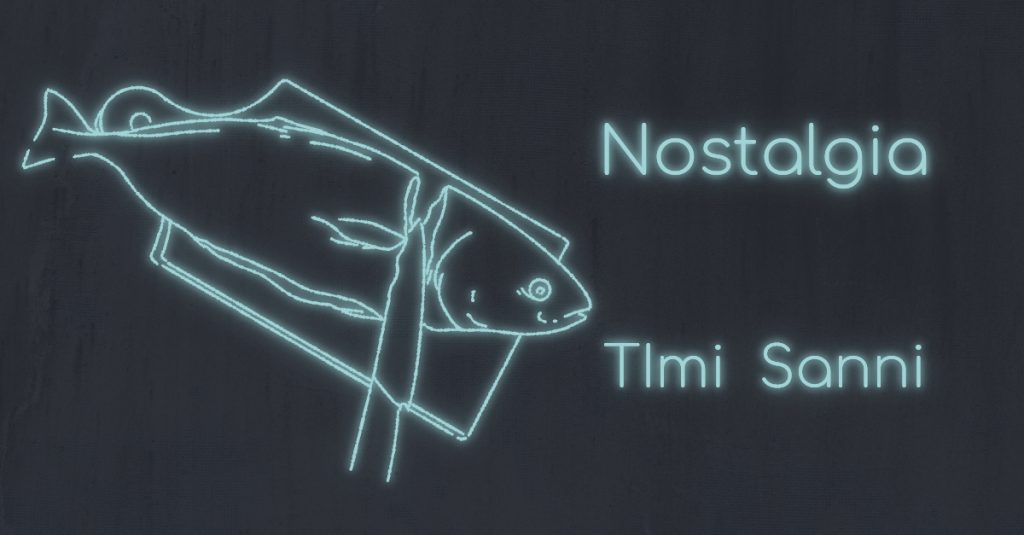I fumble with my keys and find the odd, crooked one that opens my apartment. Relief instantly douses the fire of anxiety burning through me. At first turn, the door unlocks and opens and I almost fall flat on my face. For a split second, fuzziness fills my mind like a giant wad of cotton. The thought of burglars crosses my mind but is quickly replaced by the overriding smell of onions wafting from the kitchen.
Two people had been robbed in this same building last month and I never fail to lock the door behind me when I come back home from work. But in my euphoria as I hurry into the kitchen, I have left the door ajar.
Aremu is cutting a fish on the chopping board when I enter, wearing the same grey sweater and blue jeans he’d worn the last time he left. He hears my footstep and turns, with that signature smile on his face. I make to throw my hands around him and pull him in for a hug, but he shows me his hands covered in fish blood and kisses me on the cheek instead. Sleeping butterflies rise in my belly and begin to flutter their wings. He pulls away from the kiss and continues chopping.
I expect him to be his usual talkative self, droning on about things he’d seen or done all the time he was away Or even something completely random like the last time he’d come and was droning about fish heads. “Do you know that in the abroad, they do not eat fish heads? They throw them away. I once read it in a book a long time ago, a science-fiction book, what’s its name? err…Arena, but then again, this white man I had lunch with in restaurant in V.I last week brought it all back with his peculiar disgust for fish heads. What a waste! I mean, give it to a Yoruba man and watch him suck the bones clean. And by the way, you really should read…”
But he is quiet tonight. He reaches for a plate in the rack unsuccessfully, the strain visible on his face like a grotesque mask, so I help him. I hand him a plate that had broken over a year ago, exactly one month before mother’s death. An event my superstitious colleague, Biola would later claim to be an omen. The plate is covered in an intricate flower and thorn design. Red and purple and gold and green. My mother was an artist and had designed the plate herself. The last artwork she made before she went to bed one night and her soul deserted her body in the dark, still quiet under the watch of a waning crescent moon. I’d stolen it.
Aremu stirs the soup in the pot so perfectly as though he was a chef, as though the ladle belonged solely within his palm. The bottom of the pot is black from constant use and very much less scrubbing. I do not think much of it now, but later in the night I would reminisce about how two months ago I had thrown this same pot away when it started leaking.
Aremu’s silence is beginning to worry me so I announce that I’m going into the bedroom to change my clothes. I walk out of the kitchen with a jumble of thoughts on my mind. Shouldn’t he be happy to be back? Was he still mad at me over the little issue we had before he left? Or was it something from where he had gone to? Did one of his friends say something bad about me again? I make a mental note to ask him what’s wrong as soon as I finish changing into a casual dress. Better to address the elephant at the table than wait—a mistake I won’t make a second time.
I have a quick shower and put on a pair of blue leggings and a black, low-cut top that had “Phenomenal Woman” written on its front. I wear the blouse because it’s Aremu’s favorite. I had worn it the day we first met.
The memories vanish like colors thrown into darkness, I walk back into the kitchen and find it empty. The smell of onions and aroma of boiling soup gone. The plates neatly stacked in the rack and the cooker devoid of a boiling pot of soup.
I run into the living room to see the door ajar, the space in the doorway bearing the scent of loss. My necklace dangles on my neck. I walk towards the door half-praying that the night breathes robbers into the apartment, hoping they walk in, demand my jewelries, hoping they get impatient and let loose a bullet into my body, because to live in a world where Aremu is a wind is to live within the image of death.

